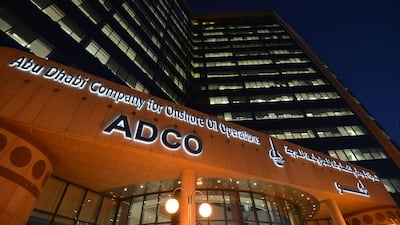BP has taken a 10 per cent stake in Abu Dhabi’s main onshore oilfield concession after a prolonged negotiation, agreeing to pay about US$2.2 billion for the stake through the issue of new shares.
As part of the deal, BP will become the manager of the Bab oilfield, one of the six main oilfields in the Abu Dhabi Company for Onshore Oil Operations (Adco) concession.
In an unusual move, BP has agreed to pay for its stake through the issue of new ordinary shares representing about 2 per cent of its issued share capital, to be held on behalf of the Abu Dhabi Government.
Sultan Al Jaber, the chief executive of Abu Dhabi National Oil Company (Adnoc) and Minister of State, said: “This agreement marks a milestone in our efforts to forge new partnership models that bring technology, expertise and financing aimed at maximising the value of our resources and supporting the transfer of knowledge.”
BP was one of the shareholders in the original Adco concession that expired two years ago, but had baulked at the high price tag set on the new 40-year concession when France’s Total agreed at the start of last year to pay about $2.2bn for its 10 per cent stake.
“BP will work closely with Adnoc to realise the full potential of these world-class resources, and I welcome Abu Dhabi as an important investor in BP,” said Bob Dudley, the oil major’s chief executive, who was in Abu Dhabi to sign the deal with Mr Al Jaber.
“This agreement will provide BP with long-term access to significant and competitive resources that we already understand very well,” Mr Dudley said. “We will bring our people, cutting-edge technology and experience of managing mature giant fields around the world to help maximise recovery from these assets.”
One of the key considerations for Abu Dhabi’s Supreme Petroleum Council, which ultimately decides on the concession holders, was the pitches that potential Adco stakeholders made about how they would use their technologies and experience to enhance the oil recovery rates for the Adco oilfields.
Typically, oilfield recovery rates have been at about 40 per cent of their estimated reserves, but Abu Dhabi leaders have wanted to push that substantially higher, to rates of as much as 70 per cent, which would represent billions of dollars of extra revenue over the lives of the fields.
But the immediate sticking point for shareholders had been the price tag of the Adco shareholding, especially in the lower oil price environment of the past two years, as well as the relatively low payment terms per barrel for the concession holders.
Inpex of Japan and GS Energy of South Korea (with the financial backing of the Korea National Oil Corporation), have also taken stakes of 5 per cent and 3 per cent, respectively. Neither will be field operators, although Japan and South Korea are Abu Dhabi’s two largest and longest-standing customers for crude oil exports.
Adnoc holds 60 per cent of Adco and said in a statement that it continues to negotiate with other potential stakeholders for the remaining 12 per cent on offer.
BP will take over operatorship of Bab from Total, which had stepped in on an interim basis to move along the field’s development, according to the Total chief executive, Patrick Pouyanne.
As part of its concession deal, Total operates the South East and Bu Hasa oilfields, which together cover about two-thirds of Adco’s output, which is currently at a rate of about 1.66 million barrels per day (bpd), or slightly more than half of Abu Dhabi’s 3.1 million bpd output.
Neither BP nor Adnoc would disclose the specific compensation terms of the deal, but BP’s chief financial officer, Brian Gilvary, said via a statement: “We have worked closely with Adnoc to structure an agreement that is attractive and strategic for both parties … the lower cost characteristics of this already producing conventional onshore oil development will be accretive to earnings and cash flow, while providing BP with another building block of long-term growth.”
Industry estimates have put the compensation at less than $2 per barrel for the concession stakeholders, but statements by Total executives and others suggest that there are incentives built into the deal for exceeded targets on the oilfield developments, plus the potential to increase terms by trading the crude oil they receive.
BP said that it will be sending about 50 of its staff to work at Bab.
BP also holds a 14.67 per cent interest in Adma-Opco, one of Abu Dhabi’s two main offshore concessions, plus 10 per cent of both the Abu Dhabi Gas Liquefaction Company (Adgas) and the National Gas Shipping Company (Ngsco).
BP said its net share of oil and gas production from Abu Dhabi is expected to rise from about 95,000 bpd to approximately 260,000 bpd next year, compared with the company’s total daily output last year of about 2 million bpd.
amcauley@thenational.ae
Follow The National's Business section on Twitter

